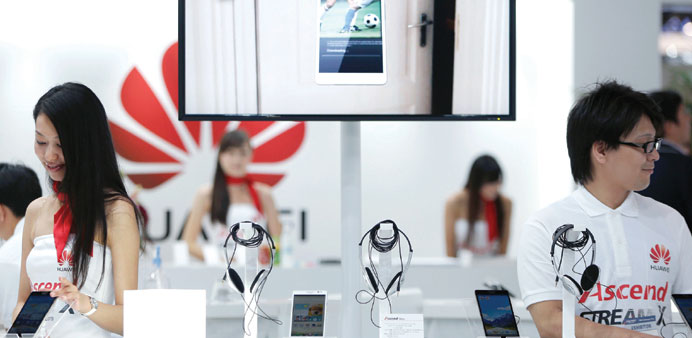Huawei Technologies Co, China’s biggest maker of phone-network equipment, is focusing investments on countries in which it has been accepted, because of lingering suspicions in the US about its motives.
“Right now we should not be expending too much effort in the US as it might take 10 or 20 years for them to know that Huawei is a company with integrity,” founder and chief executive officer Ren Zhengfei told reporters at a briefing in London yesterday. “We will accelerate efforts in countries that have accepted us.”
Ren, 69, set up Huawei in 1987 after retiring from the Chinese military in 1983. Since then, he has built the company into the world’s largest maker of equipment for phone networks behind Ericsson AB, even without access to the US telecommunications market, where Huawei has battled claims the company’s gear may provide opportunity for Chinese intelligence services to tamper with networks for spying. The closely held company has repeatedly denied those allegations, and doesn’t see a public listing as a way of building trust, Ren said. “By increasing our level of transparency, we still may not be able to address the US government’s concerns,” Ren said. “The reality is that shareholders are greedy and want to squeeze every bit out of the company. Not listing on the stock market is one of the reasons we have overtaken our peers.”
Even as Huawei fights cybersecurity concerns that have restricted access for its network equipment in the US and Australia, the company said last month its sales will rise 77% to $70bn by 2018, from $39.5bn last year.
To reach its target, Huawei is broadening its portfolio with smartphones, tablets and business-computing products, and cloud services. Ericsson, which divested its mobile-device business to focus on network equipment, has reported stalling revenue for two consecutive years. Ren acknowledges that Huawei faces a challenge to convince customers to buy its smartphones amid intense competition.
“There is no way to imitate the growth of Apple and Samsung,” he said. “We will have to work out the way for ourselves. We need to take a step-by-step approach.” The approach has begun to pay off. Worldwide, the company sold more smartphones last year than any company aside from Samsung Electronics Co and Apple Inc, as it boosted its share of the global market to 4.9%, from 4% in 2012, researcher International Data Corp reported in January.
The success has been possible as the company has faced fewer headwinds with consumer products than for its equipment that run mobile networks.
A US congressional committee in 2012 said Huawei and its competitor ZTE Corp provide opportunities for Chinese intelligence services to tamper with telecommunications networks for spying, a claim both companies have denied. “The US is a great nation in the sense that it has very good mechanisms to encourage innovation,” Ren said yesterday. “It protects its intellectual property rights very well and has a very high tolerance of people. No matter how the US has viewed Huawei, we have remained resolute to learn from them.”
Huawei was barred by the US in 2011 from participating in building a nationwide emergency network and in 2012 Australia banned the company from bidding for work on its national broadband fiber network, citing “national interests.” The tables were turned on the US in March when the New York Times and Der Spiegel reported that the spying efforts by the US National Security Agency created backdoors directly into Huawei’s networks. Huawei condemned those attacks and called for a global effort to address the challenges of network security.
With much of the security scrutiny on Huawei deriving from Ren’s military background, starting in 2011 he began splitting the CEO role with a panel of three executives who rotate at six- month intervals as acting CEO. These three are Eric Xu, Ken Hu and Guo Ping.
Ren, who said he has no hobbies other than work and making money, owns 1.4% of Huawei’s share capital, with the remainder of the company jointly held by over 84,000 of its employees, according to the company’s annual report. Ren said that this decentralized ownership structure is one of the key reasons Huawei’s profitability has surpassed its own expectations.

